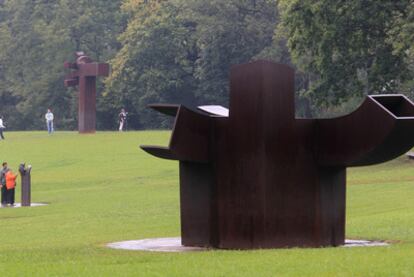Tough times for arts in a would-be culture capital
San Sebastián's array of new projects is meant to be a shop window for future success
When Museo Chillida-Leku, one of the most popular art centers in the Basque Country, announced this week that it is about to close down, it was a clear gauge of the voracity of this economic crisis. The famous sculptor's museum is just one of several cultural projects in the region that opened to a great fanfare, only to find themselves in their death throes. The current economic situation, questionable management and the inefficiency of the ruling class have combined to affect this and other significant projects in the Basque province of Guipúzcoa, such as the contemporary culture center Tabakalera, the Balenciaga Museum (devoted to the famous couturier), the new headquarters of the internationally acclaimed Orfeón Donostiarra choir and the extension of the emblematic Kursaal building in San Sebastián, the provincial capital.
Mayor Elorza: "I have the feeling that culture is every city's scapegoat"
As if that were not enough, the effects of the crisis are also being felt by the biggest cultural event in the province, the San Sebastián International Film Festival, whose hold on life is increasingly tenuous due to institutional budget cuts that will make it difficult for the event to retain its Class A status. Other major events such as the Jazz Festival, the Quincena Musical or the Week of Terror are also dealing with shrinking budgets, and the venue that hosts them each year - the Kursaal - has put extension plans on hold while it undergoes a streamlining process. Clearly, these are bad times for a city that hopes to become European Capital of Culture in 2016.
"I have the feeling that culture is the scapegoat in every city," says Mayor Odón Elorza. In May of this year Elorza himself ordered a freeze on ongoing refurbishment work in Tabakalera, a former tobacco factory, in order to bring down the costs of the ambitious initiative. In theory, there should be an institutional agreement this month to define the scope of the project and enable the completion of work by 2015, two years later than originally planned.
The annual running costs of Tabakalera were initially estimated at 15 million euros, but in the end, the regional, provincial and local authorities will only be contributing around three million euros a year each. Meanwhile, project managers are actively seeking partners that will help achieve a certain degree of self-financing.
Another cultural reference for the city, the Orfeón Donostiarra, has seen construction of its new headquarters postponed sine die. Worse still, the Balenciaga Foundation has racked up a 1.5-million-euro debt and has yet to even open its doors in the fashion designer's home town of Getaria. The new seat of the Musikene Superior Music Center has had its budget slashed from 45 to 25 million euros. And the list goes on.
San Sebastián hopes to become a European cultural capital in 2016, but there are fears that the shutdown of Chillida-Leku and the delays in inaugurating other projects could adversely affect the bid. Santi Eraso, artistic director of San Sebastián 2016, has this to say: "The public cultural system, which is presumed to be useless and without practical applications, is in crisis. But its symbolic power, its capacity for creating wealth, is just as important as building roads."
City Hall officials assert that the culture capital bid is not in danger, and that "even though the crisis is placing us all before the mirror of priorities, we would never dream of considering culture as an accessory. Culture is also an industry, and it must not be neglected." As a matter of fact, Guipúzcoa authorities have been sketching out new cultural projects, though without first bolstering existing ones. "I've already said that before doing new things, we should give priority to those near completion or about to get started," complains Elorza.
One such art center is Museo San Telmo, which will open in the spring with a 23-million-euro budget and great hopes of becoming a staple of the city's cultural scene for years to come. But a few months ago, the mayor asked the Culture Ministry for financial help to complete construction work. Its director, Susana Soto, says that "it is scary to see closures like Chillida-Leku." The Basque government's deputy culture commissioner, Antonio Rivera, says that "if there is a territory where the executive works hard on culture issues, it has to be Guipúzcoa. This sometimes has positive results, and sometimes not so positive." Is Chillida-Leku a blip, or will it set a grim precedent?

Tu suscripción se está usando en otro dispositivo
¿Quieres añadir otro usuario a tu suscripción?
Si continúas leyendo en este dispositivo, no se podrá leer en el otro.
FlechaTu suscripción se está usando en otro dispositivo y solo puedes acceder a EL PAÍS desde un dispositivo a la vez.
Si quieres compartir tu cuenta, cambia tu suscripción a la modalidad Premium, así podrás añadir otro usuario. Cada uno accederá con su propia cuenta de email, lo que os permitirá personalizar vuestra experiencia en EL PAÍS.
¿Tienes una suscripción de empresa? Accede aquí para contratar más cuentas.
En el caso de no saber quién está usando tu cuenta, te recomendamos cambiar tu contraseña aquí.
Si decides continuar compartiendo tu cuenta, este mensaje se mostrará en tu dispositivo y en el de la otra persona que está usando tu cuenta de forma indefinida, afectando a tu experiencia de lectura. Puedes consultar aquí los términos y condiciones de la suscripción digital.




























































